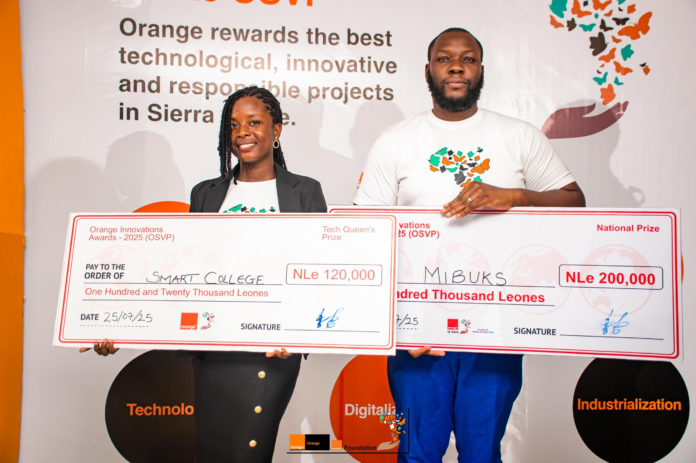By Ellen Williams
In a major boost to Sierra Leone’s tech and innovation ecosystem, Orange Sierra Leone concluded the 7th edition of the Orange Social Venture Prize (OSVP) last Friday, awarding about $15,000 (SLE300,000) in funding to top local innovators who are tackling critical development challenges through technology.
Held at the Orange Digital Centre, Hill Station, the grand finale brought together eight standout finalists whose solutions addressed urgent national needs, from digitizing small business operations and expanding access to education, to improving healthcare and financial inclusion.
At the end of a high-stakes pitch session judged by experts from tech, business, and development sectors, Edward Kamara, founder of MiBuks, was named National Prize Winner, receiving NLe 200,000 for his fintech platform that helps Micro, Small and Medium Enterprises (MSMEs) track sales, manage inventory, issue invoices, and build digital credit histories.
Meanwhile, Richlyn Kainekay Turay, representing Smart College, was crowned Tech Queen in the female category. Her platform streamlines access to higher education services and helps students manage applications, tuition payments, and academic records. She received NLe120,000.
Speaking at the ceremony, Orange Sierra Leone CEO Sekou Amadou Bah said the OSVP has become more than a competition—it’s a pipeline for nurturing a new generation of innovators capable of driving inclusive growth.
“We launched OSVP in 2019 to empower digital entrepreneurs with funding, mentorship, and access to markets,” Bah said. “This aligns with our broader mission of building Sierra Leone’s digital future, not just through telecom services, but through real investment in people, skills, and innovation.”
Bah highlighted the impact of Orange Digital Centers (ODCs) across the country, noting that six ODCs now offer coding, startup incubation, and digital literacy programs, with three dedicated to empowering women. He reported that over 5,000 youths have been trained so far, with a 15% job integration rate.
UNDP Resident Representative Fredrick Hans Ampiah praised the initiative as a model for private sector–led development and called for more structured support to build Sierra Leone’s innovation economy. “This is not just about prizes. We need coordinated investments in infrastructure, policy, financing, and talent. Ghana did it. Rwanda is doing it. Sierra Leone has the potential to become a regional innovation hub,” he stated.
He urged stakeholders to treat the country’s small market size as an advantage, ideal for testing and scaling scalable, export-ready solutions. Also speaking at the event, Minister of Communication, Technology and Innovation Salima Bah traced the country’s digital journey from policy vacuum to momentum, noting that Sierra Leone is now seen as an agile testbed for innovation.
“Seven years ago, we had no national innovation framework. Today, we are seeing real outcomes thanks to collaboration between government, private sector, and development partners,” she said.
Bah announced that the government will soon begin national consultations for Sierra Leone’s Startup Act, a dedicated legal framework to support tech-driven startups.
“Startups are not SMEs. They need tailored policies, not generic restrictions,” she said. “This Act will be co-created with the ecosystem, for the ecosystem.”
Reacting to his win, Edward Kamara of MiBuks described the award as a validation of his mission to digitize MSMEs and unlock access to finance for underserved entrepreneurs. “This platform was built to solve a real problem. We’ll reinvest the prize to expand our reach to rural communities,” Kamara said.
Richlyn Kainekay Turay, winner of the Tech Queen award, used her platform to inspire other women in tech. “This is proof that women belong in innovation,” she said. “I dedicate this to every girl dreaming of using tech to change lives.”
Their stories reflect the rising tide of youth-led, homegrown innovation in Sierra Leone, solutions born not in labs, but from lived realities, and powered by purpose. As Sierra Leone continues to embrace digital transformation, the message from this year’s OSVP was clear: empowering innovators is no longer optional; it’s essential for national development.
Orange’s investment in talent, tools, and technology is helping build the foundation. But as both UNDP and the Ministry emphasized, scaling this impact will require deeper collaboration between policymakers, investors, educators, and tech communities. With initiatives like OSVP and the upcoming Startup Act, Sierra Leone is no longer watching the digital future unfold — it is starting to shape it.



